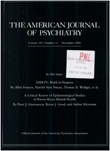Differential memory function with dopaminergic versus anticholinergic treatment of drug-induced extrapyramidal symptoms
Abstract
Nine chronic schizophrenic patients being treated with high-potency antipsychotic medication and antiparkinsonian agents were enrolled in a double-blind, crossover trial comparing amantadine and trihexyphenidyl. Memory function was assessed with the Rey Auditory-Verbal Learning Test during each 6-week drug trial. The subjects performed significantly better while receiving amantadine. Examinations of computed tomographic studies of seven subjects revealed a significant inverse correlation between ventricle size and memory while they were taking trihexyphenidyl but not amantadine. This suggests that patients with underlying brain pathology may be particularly vulnerable to the memory- disrupting effects of anticholinergic agents.
Access content
To read the fulltext, please use one of the options below to sign in or purchase access.- Personal login
- Institutional Login
- Sign in via OpenAthens
- Register for access
-
Please login/register if you wish to pair your device and check access availability.
Not a subscriber?
PsychiatryOnline subscription options offer access to the DSM-5 library, books, journals, CME, and patient resources. This all-in-one virtual library provides psychiatrists and mental health professionals with key resources for diagnosis, treatment, research, and professional development.
Need more help? PsychiatryOnline Customer Service may be reached by emailing [email protected] or by calling 800-368-5777 (in the U.S.) or 703-907-7322 (outside the U.S.).



